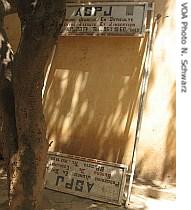-
(单词翻译:双击或拖选)
Thies, Senegal
19 June 2007
Kids who live in the streets are a growing problem in West African cities. Troubled youths, orphans1, and children with family problems often run away from their homes in small villages and wind up in cities surviving off what they can beg and steal. As Naomi Schwarz reports from the Senegalese city of Thies even the volunteers who try to help these children are suffering from a lack of resources.
In a compact square, near the center of Thies, a small Senegalese city 60 kilometers east of the capital, a group of boys hang out on benches, on a windy day.
Idrissa Diop is one of them.
He does not work, he says, and he does not go to school. Both his parents have passed away.
It was a long time ago, he says, when he was eight-years-old.
Now Diop, 18, says he lives with his grandmother in a nearby village, but it has been a long time since he was there.
"I do not sleep there," he says. "I sleep here," he continues, gesturing to the small square where he and the others have been sitting around.
Nearby, another man, Modou Barry, who hangs around with the kids, spits out a rag he has been sucking on.
The rag was infused with a drug, says Jean Badiane Seck, a volunteer with the Association for the Protection and Promotion2 of Youths (ASPJ).
Ignace Thomas, another volunteer, says drug and alcohol habits are some of the reasons these youths ended up on the streets to begin with.
Their families would punish and yell at them for drinking too much, he says, and the boys did not want to be told what to do, so they would leave.
In other cases, he says, there are family problems that lead the youth to leave. It is difficult to come by accurate statistics about the number of children living on the streets of West Africa, but there are many examples, and few opportunities for help.
| Jean Seck is surrounded by runaway teens he has helped |
We called his mother, Seck says, but she refused to accept him back.
ASPJ organized medical treatment for him, but by the time they tried to bring him to the hospital he had disappeared.
The group has been working to with runaways in Thies for more than 10 years. Founded by a sociologist6 from a nearby village, the association used to have a shelter that offered programs in the arts and skills for street kids. They also offered start-up money and advice to help some youths find legitimate7 employment.
 |
| Center for runaways in Thies closed due to lack of funds |
Mame Couna Thioye, an activist9 with a Senegalese-based human rights non-governmental organization, says the number of kids on the streets is growing.
She says the problem is that people are not enforcing laws designed to protect children.
She says, legally, all children under the age of 15 should be in school, but many are not.
Families, driven by poverty, see children as an extra helping10 hand and send them to work.
And, Thioye says, when troubled kids rebel or run away from a problem situation at home, there is no state mechanism11 to help them.
 收听单词发音
收听单词发音
1
orphans

|
|
| 孤儿( orphan的名词复数 ) | |
参考例句: |
|
|
|
2
promotion

|
|
| n.提升,晋级;促销,宣传 | |
参考例句: |
|
|
|
3
runaway

|
|
| n.逃走的人,逃亡,亡命者;adj.逃亡的,逃走的 | |
参考例句: |
|
|
|
4
runaways

|
|
| (轻而易举的)胜利( runaway的名词复数 ) | |
参考例句: |
|
|
|
5
tuberculosis

|
|
| n.结核病,肺结核 | |
参考例句: |
|
|
|
6
sociologist

|
|
| n.研究社会学的人,社会学家 | |
参考例句: |
|
|
|
7
legitimate

|
|
| adj.合法的,合理的,合乎逻辑的;v.使合法 | |
参考例句: |
|
|
|
8
pharmacy

|
|
| n.药房,药剂学,制药业,配药业,一批备用药品 | |
参考例句: |
|
|
|
9
activist

|
|
| n.活动分子,积极分子 | |
参考例句: |
|
|
|
10
helping

|
|
| n.食物的一份&adj.帮助人的,辅助的 | |
参考例句: |
|
|
|
11
mechanism

|
|
| n.机械装置;机构,结构 | |
参考例句: |
|
|
|















